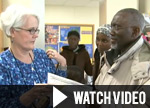Parents → Getting started in MCPS (the basics) → Health
Health Room
Every school has a health room staffed by a health technician. The technician works with a community health nurse, who may have responsibility for more than one school. Students are referred to the health room for treatment of minor injuries, other physical complaints or illnesses, and to receive prescribed medications.
If a student is sick or injured at school, health room staff will make every effort to reach the parent or the emergency contact person named on the student's information card. In the event of an emergency, the principal or other staff member will call 911 and will accompany the child if he or she is transported to the hospital.
Keep Your Child’s Emergency Information Up to Date
Be sure to let the school know immediately if there are any changes in the following:
- Parent/guardian’s home, work, and cell phone numbers and address
- Emergency contact person’s phone numbers and address (if the parent cannot be reached)
Additional Information
Head Lice
Students who have head lice will be sent home and may not return to school until the infestation has been treated successfully. To return to school, the student must be free of lice and nits (the small lice eggs on the hair strands close to the scalp). Parents should accompany their children upon their return to school for a post-treatment inspection in the health room.
Medications at School
To request that prescription or over-the-counter medication be administered to a child during the school day, parents must complete MCPS Form 525-13, Authorization to Administer Prescribed Medication , which includes a signed order from a doctor. The form is available online or at the school. The medication must be properly labeled and brought to the school health room by an adult. Students may not take any medication at school, including over-the-counter pain relievers, unless administered by school staff.
Additional Information
Screening Programs: Vision, Hearing, and Scoliosis
Schools, in collaboration with the Montgomery County Department of Health and Human Services, conduct vision and hearing screening of all students in Prekindergarten/Head Start, kindergarten, Grades 4 and 8, and students new to Maryland schools. In Grade 7, students are screened for scoliosis (curvature of the spine). Parents will be notified in advance of the screening dates and if any problems are found.
Home and Hospital Teaching
If your child will be absent from school for one month or more due to a physical illness, emotional crisis, or pregnancy, he/she may be eligible for Home and Hospital Teaching services. A teacher will come to your home, the hospital, or another facility to provide instruction for your child. Contact your child's school for more information.
Additional Information
